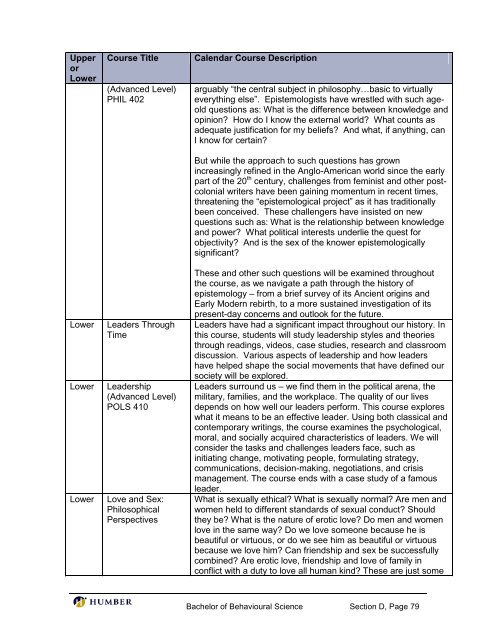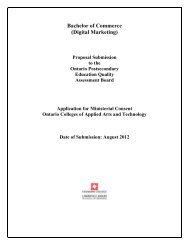Bachelor of Behavioural Science - Postsecondary Education Quality ...
Bachelor of Behavioural Science - Postsecondary Education Quality ...
Bachelor of Behavioural Science - Postsecondary Education Quality ...
Create successful ePaper yourself
Turn your PDF publications into a flip-book with our unique Google optimized e-Paper software.
Upper<br />
or<br />
Lower<br />
Lower<br />
Lower<br />
Lower<br />
Course Title<br />
(Advanced Level)<br />
PHIL 402<br />
Leaders Through<br />
Time<br />
Leadership<br />
(Advanced Level)<br />
POLS 410<br />
Love and Sex:<br />
Philosophical<br />
Perspectives<br />
Calendar Course Description<br />
arguably ―the central subject in philosophy…basic to virtually<br />
everything else‖. Epistemologists have wrestled with such ageold<br />
questions as: What is the difference between knowledge and<br />
opinion How do I know the external world What counts as<br />
adequate justification for my beliefs And what, if anything, can<br />
I know for certain<br />
But while the approach to such questions has grown<br />
increasingly refined in the Anglo-American world since the early<br />
part <strong>of</strong> the 20 th century, challenges from feminist and other postcolonial<br />
writers have been gaining momentum in recent times,<br />
threatening the ―epistemological project‖ as it has traditionally<br />
been conceived. These challengers have insisted on new<br />
questions such as: What is the relationship between knowledge<br />
and power What political interests underlie the quest for<br />
objectivity And is the sex <strong>of</strong> the knower epistemologically<br />
significant<br />
These and other such questions will be examined throughout<br />
the course, as we navigate a path through the history <strong>of</strong><br />
epistemology – from a brief survey <strong>of</strong> its Ancient origins and<br />
Early Modern rebirth, to a more sustained investigation <strong>of</strong> its<br />
present-day concerns and outlook for the future.<br />
Leaders have had a significant impact throughout our history. In<br />
this course, students will study leadership styles and theories<br />
through readings, videos, case studies, research and classroom<br />
discussion. Various aspects <strong>of</strong> leadership and how leaders<br />
have helped shape the social movements that have defined our<br />
society will be explored.<br />
Leaders surround us – we find them in the political arena, the<br />
military, families, and the workplace. The quality <strong>of</strong> our lives<br />
depends on how well our leaders perform. This course explores<br />
what it means to be an effective leader. Using both classical and<br />
contemporary writings, the course examines the psychological,<br />
moral, and socially acquired characteristics <strong>of</strong> leaders. We will<br />
consider the tasks and challenges leaders face, such as<br />
initiating change, motivating people, formulating strategy,<br />
communications, decision-making, negotiations, and crisis<br />
management. The course ends with a case study <strong>of</strong> a famous<br />
leader.<br />
What is sexually ethical What is sexually normal Are men and<br />
women held to different standards <strong>of</strong> sexual conduct Should<br />
they be What is the nature <strong>of</strong> erotic love Do men and women<br />
love in the same way Do we love someone because he is<br />
beautiful or virtuous, or do we see him as beautiful or virtuous<br />
because we love him Can friendship and sex be successfully<br />
combined Are erotic love, friendship and love <strong>of</strong> family in<br />
conflict with a duty to love all human kind These are just some<br />
<strong>Bachelor</strong> <strong>of</strong> <strong>Behavioural</strong> <strong>Science</strong> Section D, Page 79
















